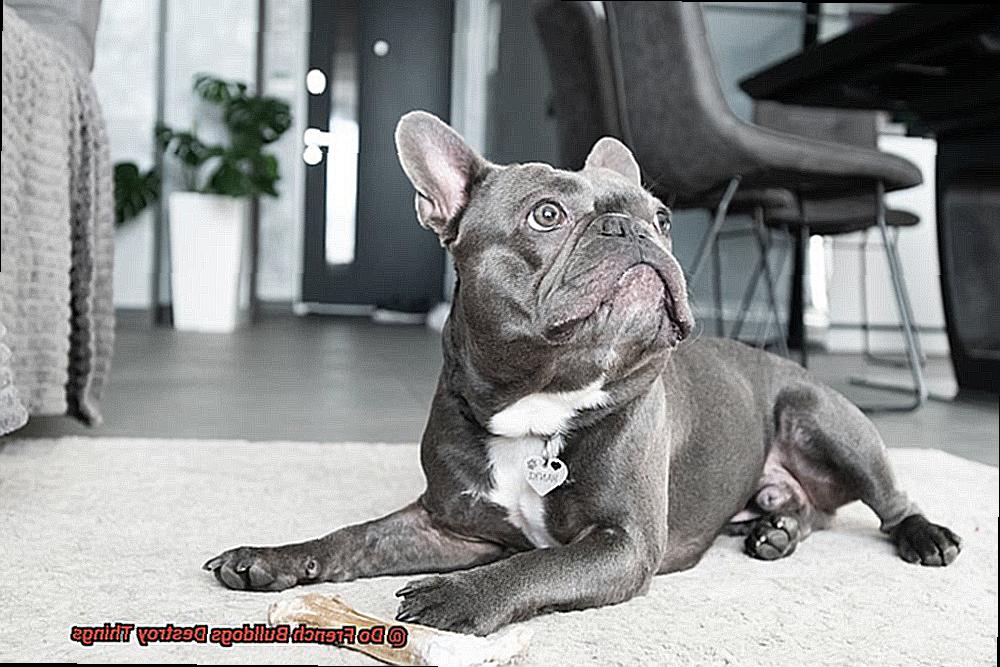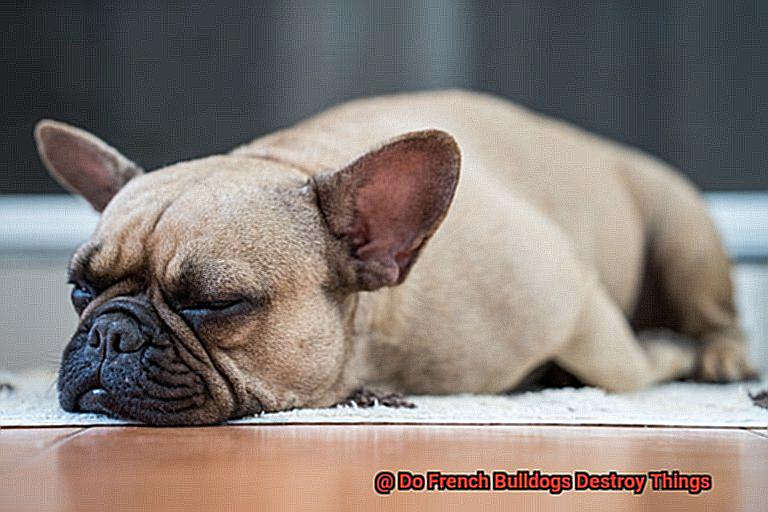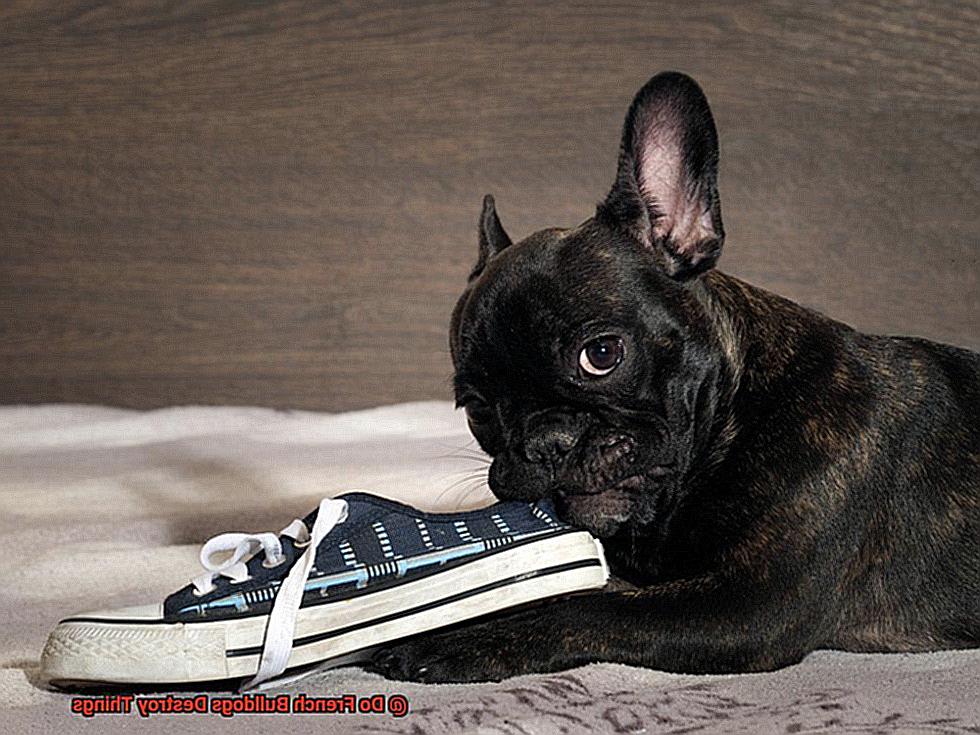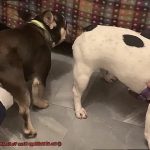Do French Bulldogs Destroy Things?
If you’ve ever wondered whether French bulldogs have a knack for transforming your home into a scene straight out of a disaster movie, you’re in for a wild ride. Get ready to explore the world of these mischievous little devils as we uncover the truth about their destructive tendencies.
With their wrinkled faces that could melt even the iciest hearts, ears that resemble adorable bat wings, and snorts that could rival a symphony orchestra, French bulldogs have skyrocketed in popularity. But beneath those innocent eyes lies an unpredictable nature that can turn your peaceful abode into a war zone faster than you can say “sit.”
In this blog post, we’ll dig deep into the reasons behind why Frenchies seem to have an insatiable appetite for destruction. And fear not. We won’t leave you hanging with just the problem; we’ll also serve up some foolproof solutions to help maintain harmony between your beloved Frenchie and your precious possessions. Whether you’re already a proud parent or contemplating adding one to your family, stick around because we’re about to unveil the secrets behind those infamous tales of canine chaos.
So grab yourself a steaming cup of joe or tea, find your comfiest spot on the couch, and prepare yourself for an eye-opening journey through the world of French bulldog destructiveness. Let’s dive right in, shall we?
Do French bulldogs destroy things
Contents
- 1 Do French bulldogs destroy things
- 2 What Causes French Bulldogs to be Destructive?
- 3 How to Prevent Destructive Behavior in French Bulldogs
- 4 Mental Stimulation for Your French Bulldog
- 5 Separation Anxiety and French Bulldogs
- 6 Crating Your French Bulldog to Prevent Destruction
- 7 Setting Boundaries and Consistency in Training
- 8 Professional Help for Destructive Behavior in French Bulldogs
- 9 Conclusion
French bulldogs are undeniably adorable with their smushy faces and playful personalities. But amidst their undeniable charm lies a reputation for being mischievous and sometimes destructive. So, do French bulldogs really destroy things, or is it just a stereotype? Let’s dive into this question and explore the reasons behind their potential for destructive behavior.
The Chewing Instinct:
French bulldogs have a strong chewing instinct. It’s in their DNA. This natural behavior can lead them to nibble on furniture, shoes, and anything else that catches their fancy. To redirect this instinct, provide them with appropriate chew toys such as durable rubber bones or puzzle toys. These distractions will keep them engaged while saving your valuable possessions.
Separation Anxiety and Boredom:
French bulldogs are highly social dogs that thrive on attention and companionship. When left alone for extended periods, they can experience separation anxiety and exhibit destructive behavior as a coping mechanism. To prevent this, ensure your furry friend receives plenty of mental and physical stimulation. Engage them in interactive play sessions, puzzles, or consider hiring a dog walker for regular exercise.

Training and Consistency:
Consistent training is vital to curbing destructive tendencies in French bulldogs. Establish clear boundaries and use positive reinforcement to reward good behavior. Inconsistent training or lack thereof can lead to confusion and frustration, resulting in destructive acts.
Health Issues:
Sometimes, destructive behavior can be a symptom of an underlying health issue or discomfort. If your French bulldog persists in destructive behavior despite your efforts, consult with a veterinarian to rule out any medical causes.
In conclusion, French bulldogs may indeed have the propensity for destructive behavior if left unstimulated or improperly trained. However, with proper mental and physical stimulation, consistent training methods, and appropriate chew toys, you can help prevent any potential destruction. Remember, every dog is unique, and some French bulldogs may be more prone to destructive behavior than others. If the problem persists, seek professional guidance from a dog trainer or behaviorist who can provide personalized strategies.
What Causes French Bulldogs to be Destructive?
French Bulldogs, with their adorable faces and playful nature, can bring so much joy to our lives. However, behind that lovable facade lies a mischievous streak that can turn your belongings into casualties. But fear not, for we are here to uncover the reasons behind their destructive tendencies and equip you with the tools to combat them. So, let’s dive in and explore the causes of French Bulldogs’ destructive behavior.
- Separation Anxiety: These cuddly companions are highly affectionate and attached to their owners. When left alone for extended periods, they may experience separation anxiety, leading to destructive behaviors such as chewing furniture, scratching doors, or soiling the house. It’s important to gradually accustom them to being alone and provide them with interactive toys or puzzle feeders to keep them engaged.
- Boredom: French Bulldogs are energetic dogs that require mental and physical stimulation. If they don’t receive enough exercise or mental enrichment, they may become bored and resort to destructive behaviors as a way to entertain themselves. Make sure to provide them with daily exercise and interactive toys that challenge their minds.
- Lack of Training: Proper training is crucial for any dog breed, including French Bulldogs. Without consistent training and clear boundaries, they may not understand what is acceptable behavior and can engage in destructive activities. Enroll them in obedience classes or work with a professional trainer to teach them appropriate behaviors and establish a positive reinforcement routine.
- Teething Troubles: Like all puppies, French Bulldogs go through a teething phase where they experience discomfort and an urge to chew. If they don’t have appropriate chew toys or outlets for their teething needs, they may resort to destructive chewing on furniture, shoes, or household items. Provide them with a variety of safe chew toys and redirect their chewing behavior towards those items.
- Unmet Physical Needs: French Bulldogs have specific physical needs that must be fulfilled to prevent destructive behaviors. They require regular exercise, playtime, and mental stimulation. Failing to meet these needs can result in pent-up energy that may be released through destructive actions. Set aside dedicated time for exercise and play, and engage them in activities that challenge their minds.
- Lack of Socialization: Proper socialization is essential for French Bulldogs to develop good behavior and manners. If they are not exposed to different environments, people, animals, and experiences from an early age, they may become anxious or fearful in unfamiliar situations, leading to destructive behaviors. Expose them to various stimuli gradually and positively reinforce their calm behavior in new situations.
- Health Issues: In some cases, destructive behavior in French Bulldogs can be a sign of an underlying health problem. Pain or discomfort caused by conditions like dental issues, allergies, or gastrointestinal problems can manifest as destructive tendencies. If you notice any changes in their behavior, consult with a veterinarian to rule out any medical issues.
How to Prevent Destructive Behavior in French Bulldogs
French Bulldogs are adorable and affectionate companions, but like any breed, they can exhibit destructive behaviors if not properly trained and stimulated. From chewing furniture to tearing up household items, these behaviors can be frustrating for dog owners. However, with the right strategies and consistent training, you can prevent destructive behavior and create a harmonious environment for both you and your furry friend.
Exercise and Mental Stimulation:
French Bulldogs are energetic dogs that require regular exercise to burn off excess energy and prevent boredom. Engage them in daily walks, playtime sessions, or interactive toys to keep their minds and bodies active. Puzzle toys or treat-dispensing toys are excellent options to provide mental stimulation while keeping them entertained.
Redirect Chewing Behaviors:
French Bulldogs have a natural instinct to chew, so it’s crucial to provide them with appropriate chew toys and items. Durable toys made specifically for strong chewers can redirect their chewing tendencies away from your furniture or belongings. Be sure to rotate the toys to keep their interest high.
Crate Training:
Crate training can be a valuable tool in preventing destructive behavior when you’re unable to supervise your French Bulldog. A crate provides a safe and secure space for your dog, reducing the chances of them engaging in destructive behaviors. Introduce the crate gradually and make it a positive experience with treats, toys, and cozy bedding.
Consistency is Key:
Establishing a routine and sticking to it helps create stability for your French Bulldog. They thrive on predictability and clear boundaries, so consistency is crucial in preventing destructive behavior. Set clear rules and expectations, reward good behavior with treats or praise, and redirect or ignore unwanted behavior.
Address Underlying Issues:
Destructive behavior may stem from underlying issues such as separation anxiety, boredom, or a lack of proper training. If your French Bulldog continues to exhibit destructive behavior despite your efforts, consult with a professional dog trainer or behaviorist. They can help identify and address the root causes of the behavior, providing tailored strategies to prevent further destruction.
Mental Stimulation for Your French Bulldog
French Bulldogs are intelligent and active dogs that thrive on mental stimulation. Without proper mental exercise, they can become bored and resort to destructive behaviors. In this article, we will explore various ways to provide mental stimulation to your French Bulldog, helping prevent destructive tendencies and promoting their overall well-being.
Interactive Toys:
Interactive toys are a great way to keep your French Bulldog mentally engaged. Treat-dispensing toys or puzzle toys require problem-solving skills to access the treats or toys inside. This not only keeps them entertained but also exercises their brain. Rotate different toys regularly to keep the novelty factor high.
Puzzle Games:
Engage your French Bulldog’s cognitive abilities by playing puzzle games. Hide treats around the house and encourage them to use their sense of smell to find them. Teach them new tricks or commands, challenging their ability to learn and problem-solve. These games keep their minds sharp and prevent boredom.
Training Sessions:
Regular training sessions not only provide mental stimulation but also strengthen the bond between you and your French Bulldog. Teach them new commands or tricks, using positive reinforcement techniques. This mental exercise will tire them out and prevent destructive behavior.
Enrichment Activities:
Tap into your French Bulldog’s natural instincts with enrichment activities. Scent games, where they have to find hidden items using their sense of smell, are mentally stimulating for them. Additionally, agility courses provide both mental and physical exercise, keeping them engaged and focused.
Rotating Activities:
To prevent boredom, it is crucial to rotate and introduce new activities regularly. This keeps the French Bulldog interested and prevents them from seeking out destructive behaviors due to lack of mental stimulation.
Separation Anxiety and French Bulldogs
French Bulldogs are notorious for their tendency to develop separation anxiety, which can lead to destructive behaviors and heart-wrenching distress. But fear not. With a little understanding and some pawsitive action, we can help our furry friends overcome this common issue.
Understanding Separation Anxiety in French Bulldogs:
What is Separation Anxiety?
- Separation anxiety occurs when a dog becomes anxious and distressed when separated from their owner or left alone.
- French Bulldogs, with their strong attachment to their humans, are particularly susceptible to this condition.
- Symptoms may include excessive barking, destructive chewing, pacing, indoor accidents, and escape attempts.


Causes of Separation Anxiety:
- Changes in routine, new environments, or traumatic experiences can trigger separation anxiety in French Bulldogs.
- Individual temperament and previous experiences also play a role.
Treating Separation Anxiety in French Bulldogs:
Behavior Modification Techniques:
- Gradually desensitize your Frenchie to being alone by starting with short periods of separation and rewarding calm behavior.
- Create positive associations with alone time through treats or favorite toys.
Environmental Enrichment:
- Provide mental stimulation with interactive toys and puzzle feeders.
- Keep your Frenchie’s mind engaged by teaching new tricks or participating in training sessions.
Medication:
Patience and Consistency:
- Dealing with separation anxiety takes time and consistency.
- Remain patient and avoid punishment, as it can worsen anxiety.
Seeking Professional Help:
Prevention is Paw-sible:
Proactive Measures:
- Ensure your Frenchie gets plenty of exercise to prevent pent-up energy.
- Create a safe, comfortable space for them when left alone.
- Gradually increase the duration of absences to help them adjust.
Crating Your French Bulldog to Prevent Destruction
Crating your French Bulldog can be an effective way to prevent destructive behavior when you’re unable to supervise them. In this section, we’ll explore the benefits of crate training, how to introduce your Frenchie to their crate, and tips for establishing a positive association with it. Let’s dive in.
Choosing the Right Crate:
Selecting the right crate for your French Bulldog is crucial. It should be large enough for them to stand, turn around, and lie down comfortably. Consider a crate with a sturdy build and proper ventilation. Here’s a quick checklist:
- Size: Measure your Frenchie’s height and length to ensure the crate is suitable.
- Material: Opt for a durable material like metal or plastic.
- Ventilation: Look for crates with adequate airflow to keep your dog comfortable.
Introducing Your Frenchie to Their Crate:
To make the crate a welcoming space, introduce it gradually. Follow these steps:
- Place their favorite toys, blankets, and treats inside the crate to create positive associations.
- Keep the door open initially, encouraging your Frenchie to explore the crate at their own pace.
- Use praise and rewards to reinforce positive behavior when they enter or stay in the crate willingly.
Establishing a Consistent Routine:
Consistency is key when crate training your French Bulldog. Establish a routine that includes regular potty breaks, exercise, and playtime outside of the crate. Avoid leaving your Frenchie crated for extended periods as they need social interaction and mental stimulation.
Gradual Increase in Crate Time:
Start with short periods of crating and gradually increase the duration over time. This helps your Frenchie become comfortable with being confined. Monitor their behavior during crate time, ensuring they are relaxed and not showing signs of distress.
Providing Mental Stimulation:
To prevent boredom and destructive behavior, provide mental stimulation in the crate. Use interactive toys or puzzle feeders to keep your Frenchie entertained. This can help redirect their energy and focus.
Monitoring Your Frenchie’s Behavior:
Always keep an eye on your Frenchie while they’re crated. Watch for signs of anxiety or discomfort, such as excessive panting, whining, or scratching at the crate. If you notice these signs, consult with a professional dog trainer or behaviorist for guidance.
Setting Boundaries and Consistency in Training
French Bulldogs are intelligent and eager to please, but they also have a stubborn streak. To prevent destructive behavior, it is crucial to set boundaries and maintain consistency in training. Here are some tips to help you establish and enforce rules effectively:
- Clearly Define Rules and Boundaries: From the moment you bring your French Bulldog home, make sure they understand what behaviors are acceptable and what are not. Establish rules regarding furniture access, jumping, chewing, and other common issues.
- Be Firm and Consistent: Consistency is key in training French Bulldogs. Always respond to their behavior in a consistent manner. If you allow them on the couch one day and then scold them for it the next, they will become confused. Stick to your rules and expectations.
- Use Positive Reinforcement: French Bulldogs respond well to positive reinforcement techniques. Reward good behavior with treats, praise, or playtime. This will motivate them to repeat the desired behavior while discouraging destructive actions.
- Crate Training: Crate training can be a valuable tool in setting boundaries and preventing destructive behavior when you cannot supervise your French Bulldog. Ensure the crate is comfortable and inviting, gradually increase crate time, and never use it as punishment.
- Provide Outlet for Energy: French Bulldogs are active dogs that require regular exercise and mental stimulation. Provide them with appropriate outlets for their energy through walks, playtime, interactive toys, and puzzles. This will help prevent boredom and destructive behavior.
- Close Supervision: During the initial stages of training, closely supervise your French Bulldog to prevent them from developing bad habits or engaging in destructive behavior. Redirect their attention if you notice them engaging in unacceptable actions.
- Seek Professional Help if Needed: If you are struggling with setting boundaries or if your French Bulldog continues to engage in destructive behavior despite consistent training efforts, do not hesitate to seek professional help. A professional dog trainer or behaviorist can provide guidance tailored to your specific situation.
Professional Help for Destructive Behavior in French Bulldogs
French Bulldogs are adorable and lovable companions, but their destructive behavior can be frustrating and challenging to deal with. Fortunately, professional help is available to address and manage these destructive tendencies.
In this article, we will explore the strategies used by experts – veterinarians and certified dog behaviorists – to effectively tackle destructive behavior in French Bulldogs.
Step 1: Schedule a Visit with Your Veterinarian
Before seeking behavioral help, it is crucial to rule out any underlying medical conditions that may be contributing to your Frenchie’s destructive behavior. A visit to your veterinarian will help determine if there are any physical issues that need to be addressed.
Step 2: Consult with a Certified Dog Behaviorist
Once medical issues are ruled out, it is time to seek the expertise of a certified dog behaviorist. These professionals will assess your Frenchie’s behavior and develop a customized plan to address the destructive tendencies. They will consider factors such as age, temperament, environment, and history to create an effective behavior modification plan.
Step 3: Positive Reinforcement Training Techniques
One of the key strategies used by professionals is positive reinforcement training. This technique involves rewarding desired behaviors and redirecting destructive tendencies towards more appropriate actions. With consistency and patience, your Frenchie will learn that good behavior yields rewards.
Step 4: Environmental Enrichment
To alleviate boredom and reduce destructive behavior, professionals often focus on environmental enrichment. This includes providing mental stimulation through puzzle toys, interactive games, and regular exercise. A tired Frenchie is a well-behaved Frenchie.
Step 5: Addressing Separation Anxiety
Separation anxiety can be a significant contributor to destructive behavior in French Bulldogs. A professional can recommend desensitization and counterconditioning exercises to help your Frenchie feel more comfortable when alone. Additionally, they may suggest gradually increasing the time spent apart to build confidence and reduce anxiety.
Step 6: Medication, if Necessary
In severe cases, medication may be recommended by the veterinarian or behaviorist to manage underlying anxiety or fear-related issues that contribute to destructive behavior. Medication should always be used under professional guidance and in conjunction with behavior modification techniques.
f3XueAlb5Q4″ >
Conclusion
French bulldogs, with their playful and mischievous nature, can indeed have a tendency to destroy things. From chewed-up shoes to shredded pillows, these adorable little troublemakers can wreak havoc on your belongings. However, it’s important to remember that destructive behavior in French bulldogs is not inherent or exclusive to the breed. Like any dog, their behavior is influenced by various factors such as training, socialization, and individual personality.
It’s crucial to provide your French bulldog with appropriate outlets for their energy and mental stimulation. Regular exercise and engaging toys can help redirect their destructive tendencies towards more productive activities. Additionally, crate training can be an effective way to prevent them from causing damage when left unsupervised.
While some French bulldogs may have a predisposition for destruction, it’s essential not to generalize this behavior to all members of the breed. Each dog is unique and may exhibit different behaviors based on their upbringing and environment.
In conclusion, while French bulldogs may have a propensity for destroying things, it is not an inherent trait of the breed. With proper training, socialization, and providing them with appropriate outlets for their energy, you can minimize destructive behavior in your furry friend.




